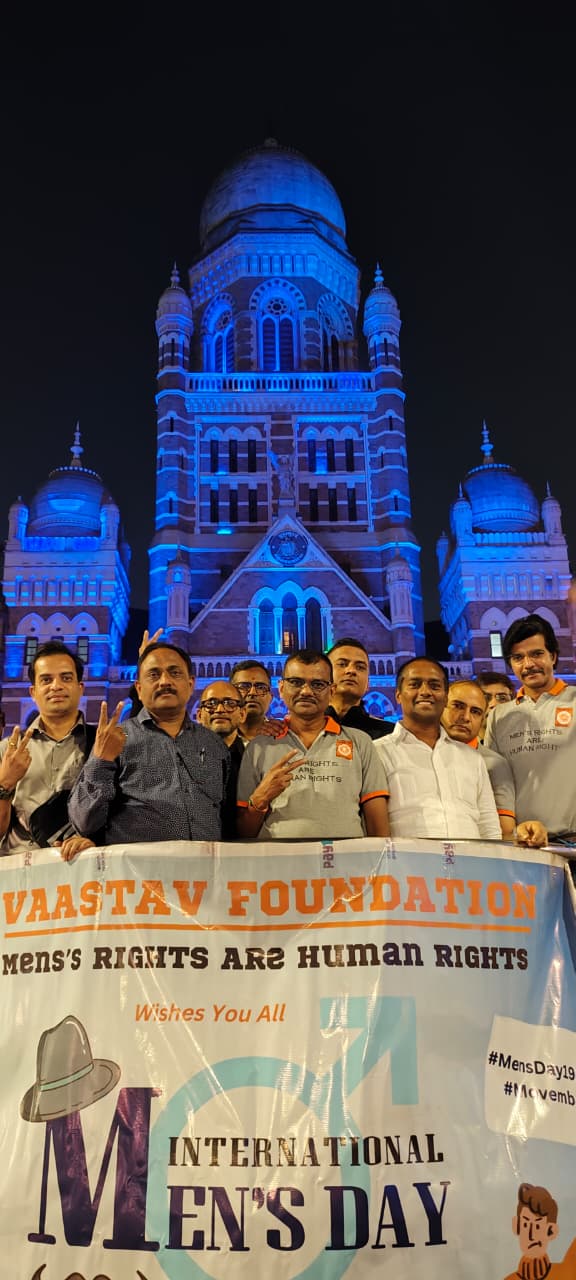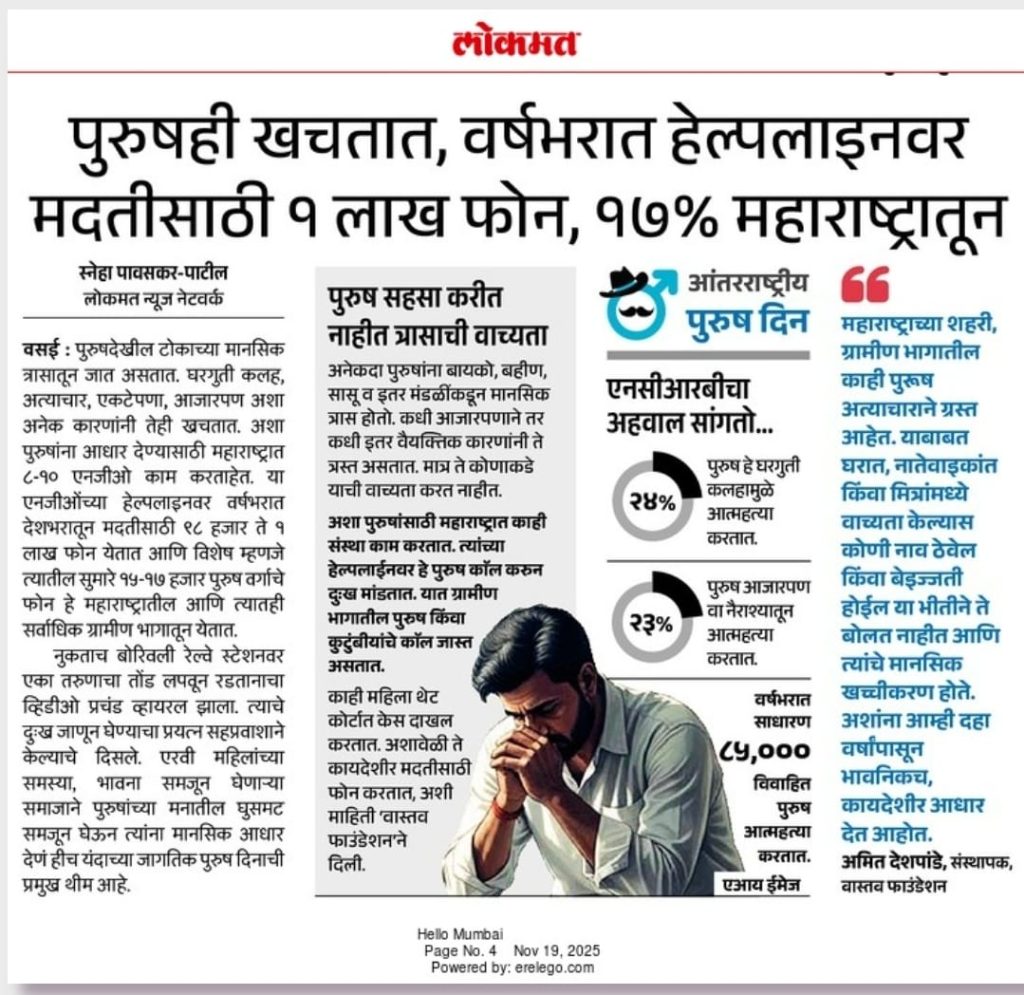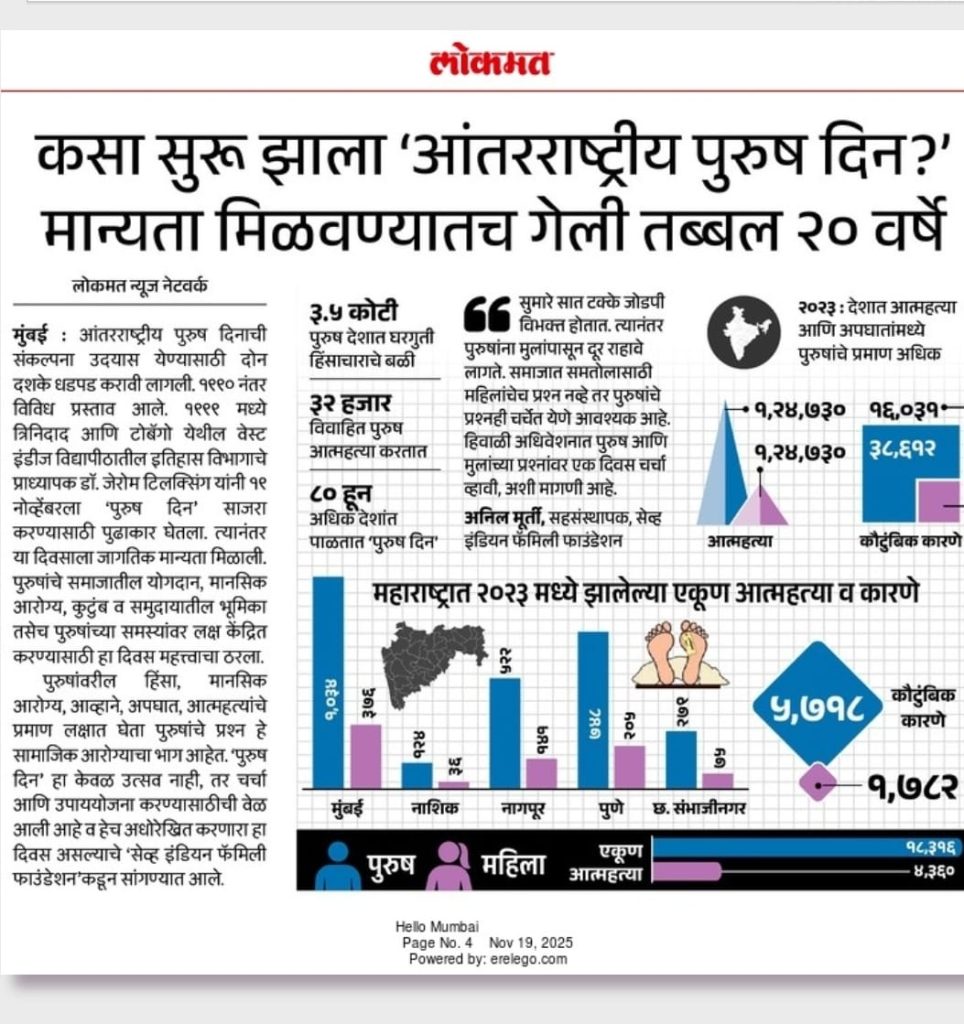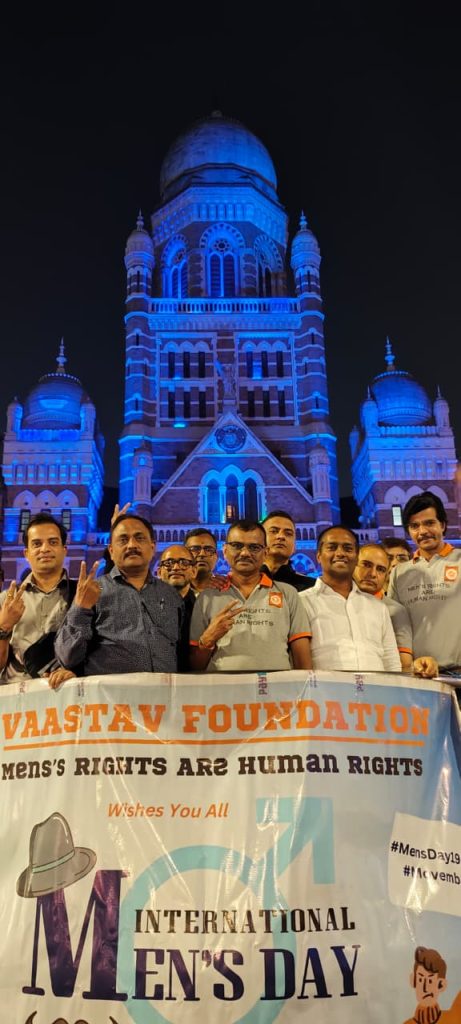Mumbai, 19 November 2025 — The Vaastav Foundation marked International Men’s Day (IMD) in a powerful, public way today, transforming the bustling concourse of Chhatrapati Shivaji Maharaj Terminus (CST) into a hub of awareness, empathy, and activism. As men’s rights conversations gain momentum across India, Vaastav’s flagship event makes a bold statement: men’s issues matter — in legal systems, in mental health, and in society at large.
A Blue Monument, A Proud Brotherhood — The Heart of Men’s Day at CST
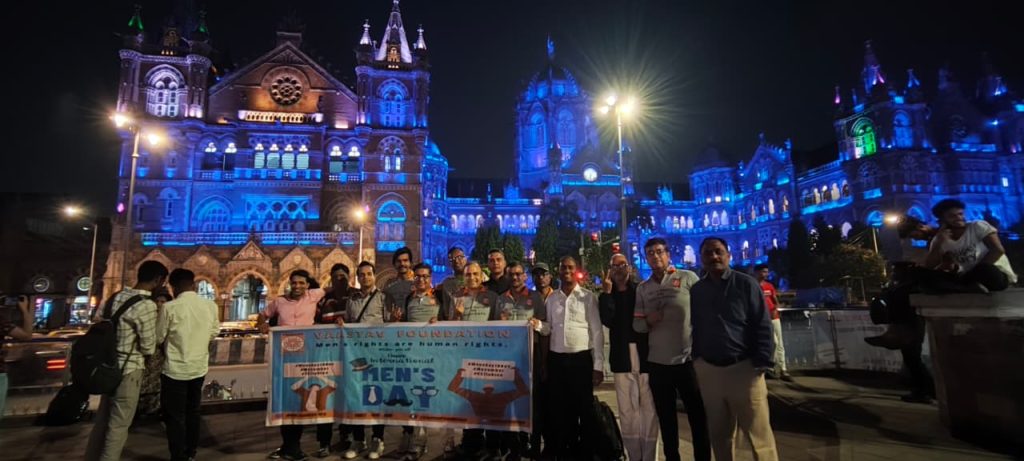
Tonight, Mumbai witnessed something powerful.
As the sun dipped and the sky turned deep and silent, the magnificent CST building lit up in blue — glowing like a proud guardian watching over the city. In those lights, every arch and dome seemed to speak one message: men matter too. The blue illumination wasn’t just decoration; it felt like a long-awaited recognition, a tribute to the countless silent battles men fight every single day.
In front of this shimmering monument stood the Vaastav Foundation volunteers, brothers shoulder to shoulder, hearts steady, spirits high. Their banner stretched wide, their fists raised, their smiles fearless. Seeing them stand there — ordinary men, yet extraordinary in courage, against the tide of falsehood that is well tamed against them — felt like watching history breathe. They weren’t demanding privilege. They were celebrating dignity. They were honoring responsibility. They were reminding India that men’s rights are human rights.
Tonight, their presence turned the CST plaza into something more than a railway square. It became a statement. A symbol. A victory.
A reminder that International Men’s Day is not just a date, it is an achievement.
A celebration earned through decades of silence, struggle, stigma, and survival.
For every father who lost access to his child,
For every husband fighting false cases,
For every son carrying the weight of expectation,
For every man who never found a place to cry —
the blue lights shone for them.
And as the Vaastav volunteers stood proudly under the glowing CST domes, it felt as though the city itself finally whispered back to them:
“We see you. We hear you. You matter.” A Legacy of Men’s Rights Activism
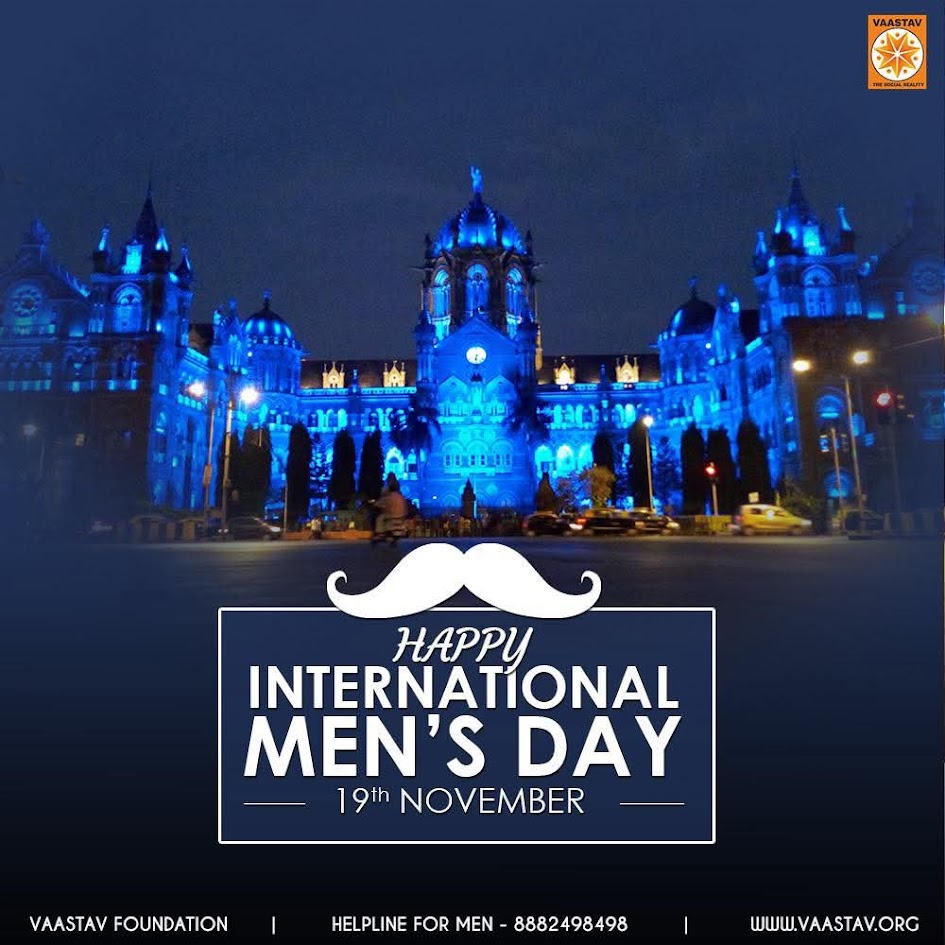
Vaastav Foundation has long been one of India’s most consistent advocates for men’s wellbeing. Over the years, it has organized awareness campaigns, legal clinics, support groups, and public events — especially around International Men’s Day. Notably, in previous IMD observances, Vaastav has leveraged CST Station itself as a symbolic venue, calling attention to men’s struggles in a highly visible, public space.
In 2017, for instance, Vaastav coordinated efforts to light up CST in blue in honor of Men’s Day — a visual and symbolic gesture of solidarity. For 2025, the Foundation has returned to CST, but this time with a full-scale public campaign that combines on-ground engagement, storytelling, and legal empowerment. More Info Here
What’s Happening at CST: IMD 2025 Event Details
On 19 November 2025, Vaastav’s CST event features:
Brothers engage commuters in conversations about men’s legal rights, family disputes, mental health, and misuse of gender-biased laws. They provide guidance, share information, and invite men to reflect on their own experiences. These dedicated spaces allow men to share personal stories. Many are expected to speak on deeply sensitive topics: false allegations, emotional abuse, depression, parental alienation, and suicidal thoughts.Large posters and displays highlight alarming realities — such as high male suicide rates, lack of visitation rights for divorced fathers, the stigma men face when expressing emotional distress, and the need for gender-neutral legal reform.Vaastav ensures its message reaches not just activist circles, but everyday people: the commuter, the office-goer, the student.
Why International Men’s Day Still Matters
International Men’s Day is more than just a celebration. It’s a chance to:
- Recognise men’s contributions — to family, work, society.
- Address men’s health issues — mental as well as physical.
- Highlight socio-legal challenges many men face, such as false cases, lack of access to fair representation, or emotional harm.
- Promote a healthier, more responsible vision of masculinity — one rooted in empathy, emotional strength, and accountability.
- Provide supportive spaces for men who are often unheard, isolated, or stigmatized.
In India today, the excitement around IMD is growing. From Mumbai to Kolkata, Bengaluru to Delhi, more NGOs, grassroots groups, and men’s collectives are organizing discussions, events, and campaigns. The narrative is shifting: men’s struggles are no longer a fringe issue.
The Case of Atul Subhash & Judge Rita Kaushik
A central theme of the CST outreach is legal injustice — and nowhere is that more painfully illustrated than in the case of Atul Subhash, a Bengaluru-based technologist, and Judge Rita Kaushik.
In November 2023, Atul filed formal complaints alleging sustained harassment by his estranged wife, in-laws, and issues within the family court system. He accused Judge Rita Kaushik of overseeing what he claimed were unfair legal proceedings and enabling the misuse of laws meant to protect. By March 2024, the pressure on Atul had mounted. He spoke of emotional distress, financial burden, and a sense of helplessness.Tragically, in June 2024, Atul took his own life. His suicide note detailed serious allegations: lack of visitation rights, biased treatment in court, and a system that failed to hear him.Vaastav’s event at CST does not shy away from this grim reality. Instead, it uses the case to highlight the urgent need for legal reform, emotional support, and systemic accountability.

Who is family judge Rita Kaushik, mentioned in Bengaluru techie Atul Subhash’s suicide note, video records? What are the allegations?
Atul Subhash’s suicide note, alleging bribery by Family Court Judge Rita Kaushik and a court clerk, raises concerns about India’s judicial system. The techie claimed that harassment from his wife and in-laws led to his death, prompting police to register an abetment to suicide case against them.
Voices from Social Media & the Broader Movement
Mens Rights X/Twitter enthusiasm can be felt. Its reinforced the message: men are not just strong — they are vulnerable, too, and they need avenues for help. The social media campaign feeds into the real-world activism happening right now.
International Mens Day Celebration in Kolkata.
Across India, more Men’s Day events are happening in parallel: in Kolkata, Pune, Delhi, Chennai, and more. These are not isolated rallies but part of a national surge, as men and allied organizations amplify their voices.

International Resonance: A Global Men’s Rights Phenomenon
The issues being raised in India echo globally. International Men’s Day is gaining traction everywhere, because many countries are confronting similar male-specific societal pressures:
- In Japan, aging men often die alone (“kodokushi”), isolated by social fragmentation and loneliness.
- In South Korea, men face tremendous work stress, societal expectations, and legal systems that critics say disadvantage fathers — especially when it comes to child custody, visitation, and financial obligations.
- Around the world, men’s rights discussions are growing around parental alienation, alimony, visitation rights, mental health, and the lack of gender-neutral legal protections.
International Men’s Day is fast becoming a global movement — one that demands not just attention, but reform.
Men Matter, and Their Issues Can No Longer Be Ignored
Vaastav Foundation’s International Men’s Day event at CST Station, Mumbai is a milestone — not just in terms of visibility, but in its depth. The event blends personal stories, legal awareness, public engagement, and social advocacy.
Today’s gathering reflects a broader reality: men’s problems — from false legal cases to emotional trauma — are real, urgent, and in need of public redress. Across India, more people are showing up. Across the world, more countries are listening.
International Men’s Day is no longer a whisper. It’s a movement. It’s time men’s voices were heard loud and clear.
What should the government do for Mens Rights ?
The government must also expand mental-health support for men, who often under-report emotional distress and face higher suicide rates in many regions. Public campaigns should counter stereotypes that men must always be strong or financially dominant, and workplace policies must support paternity leave, parental equality, and gender-neutral harassment protections. However, for any of this to succeed, the political will and active motivation of the government are essential—yet too often, the system works in ways that alienate or overlook men’s issues instead of supporting them. A truly fair society requires a gender-neutral justice and welfare approach that respects and protects everyone equally.

